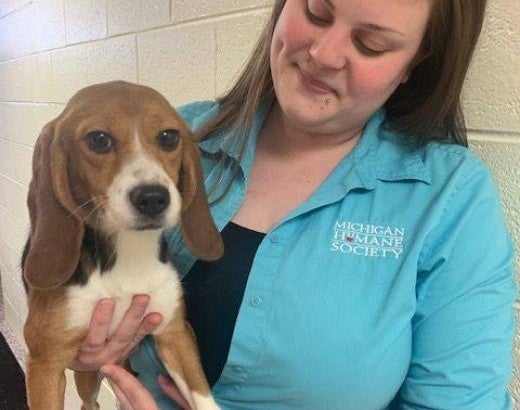It wasn’t long ago that I witnessed the first van full of beagles arrive at our care and rehabilitation center in Maryland. On July 21, I was on hand to help welcome these dogs into a new and beautiful chapter of their lives, and I had the honor of carrying the first beagle off the transport van. Then, members of our Animal Rescue Team went onto the van, one after the other, emerging again and again, each holding literal armfuls of young beagles. At that moment, the scale of this operation started to dawn on me and, I suspect, everyone else who was present. Each beagle represented a life spared from unthinkable suffering. Many of us were fighting back tears of gratitude that they would never have to experience life as subjects of animal testing.
Flash forward to now, just six weeks later, and our team has removed the last 312 of roughly 4,000 beagles from Envigo RMS LLC’s facility in Cumberland, Virginia, which was breeding the dogs to be sold to animal testing laboratories. As you know, the Humane Society of the United States was approached by the U.S. Department of Justice to remove the dogs after alleged violations of the Animal Welfare Act were found at the breeding facility, and we are elated that this week, with the help of more than 120 shelter and rescue partners, we have accomplished this massive feat.
I had the great privilege of being at our care and rehabilitation facility at the moment the last beagle, Fin, arrived. He is an older male used for breeding. Unlike the puppies who were jumping with excitement to great their new lives, Fin seemed weary and unsure. As I carried him, I tried to comfort him and assure him that his life from this moment forward would forever change. I kept checking on Fin, and I was relieved to see him starting to relax and explore his surroundings later in the day with the help of our team. When all the dogs were fed, cleaned, cared for and ready for bed, the team stepped back and took a moment to marvel at this unprecedented rescue of nearly 4,000 souls. I looked at the faces of our staff and volunteers who have been going non-stop for six weeks, and I tried not to tear up as I watched their exhaustion give way to relief and then joy.
The vast majority of the beagles have already been placed with local organizations in 29 states that have been working to pair them with the loving homes they so deserve. We’ve heard so many happy endings from shelter and rescue staff and the adoptive families who have welcomed these dogs into their hearts and homes, and we look forward to hearing thousands more. (One former breeding mother beagle has already had her fairy tale ending, now that she’s been adopted by the Duke and Duchess of Sussex.)

Our Animal Rescue Team’s work to complete the transfer of these beagles is a milestone in a fight we’ve been waging for years. The irony of this breeding facility being cited for Animal Welfare Act violations is that regardless of how these animals were treated there, most of the dogs were ultimately destined for a life of pain, suffering and isolation. Most of them would have been sold just to spend their short lives in laboratories.
Many people don’t realize that an average of 60,000 dogs just like these are still used in animal laboratories each year. With the remarkable advances in technology that we as a society now enjoy in pretty much every other sphere of innovation, it’s unthinkable that a paradigm shift has not occurred on a larger scale for research laboratories, replacing outdated animal testing with modern non-animal approaches that not only spare dogs and other animals immense suffering, but also provide information more relevant to human biology. While we have worked for decades at the federal level on this issue, state legislatures are also playing a role to accelerate the shift away from animal testing. California recently passed legislation to prohibit the use of dogs for testing of certain products, such as pesticides and food additives. We are hopeful Gov. Gavin Newsom will soon sign this bill into law, the first of its kind in the U.S. Virginia also passed multiple laws addressing facilities that breed dogs for laboratories, the first to do so. But there is still much to do to end testing on dogs and other animals and replace them with modern technologies.
As honored as we are to have completed this historic transport, I hope this is the last time we are asked to empty a facility that profits from animal testing. Even as we celebrate these lucky dogs going to loving homes, we’re focused on creating a future where no dogs will face that kind of fate.
Follow Kitty Block on Twitter @HSUSKittyBlock.



